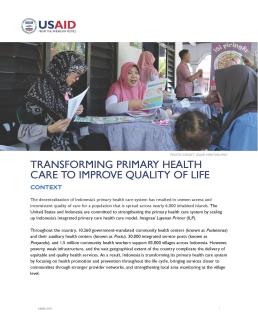Context
The decentralization of Indonesia’s primary health care system has resulted in uneven access and inconsistent quality of care for a population that is spread across nearly 6,000 inhabited islands. The United States and Indonesia are committed to strengthening the primary health care system by scaling up Indonesia’s integrated primary care health care model, Integrasi Layanan Primer (ILP).
Throughout the country, 10,260 government-mandated community health centers (known as Puskesmas) and their auxiliary health centers (known as Pustu), 30,000 integrated service posts (known as Posyandu), and 1.5 million community health workers support 83,000 villages across Indonesia. However, poverty, weak infrastructure, and the vast geographical extent of the country complicate the delivery of equitable and quality health services. As a result, Indonesia is transforming its primary health care system by focusing on health promotion and prevention throughout the life cycle, bringing services closer to communities through stronger provider networks, and strengthening local area monitoring at the village level.
USAID Mentari-Primary Health Care (USAID MENTARI-PHC)
USAID MENTARI-PHC supports the transformation of Indonesia’s primary health care services through the scale up of ILP. The activity works with Muhammadiyah, one of the largest faith-based organizations in Indonesia, to implement strategies that improve health governance, foster learning, and engage communities and civil society on primary health care at the sub-national level. MENTARI-PHC is one of three USAID activities that focuses on strengthening the primary health care system in Indonesia. USAID’s primary health care programs advance:
- Sustainable access to quality service delivery across the life cycle by improving the capacity of community health centers and their networks of village-based health offices.
- Understanding of ILP topics at the provincial and district levels, such as telemedicine, facilitative supervision, performance-based incentives for community health workers, and public/private provider networks, including in mental health services.
- Performance of the health system and ILP by strengthening community engagement and social accountability, local governance of ILP systems, and the quality and utilization of data for decision making.
USAID MENTARI-PHC works in 15 districts and cities in South Sulawesi and East Java provinces. It closely coordinates with USAID MOMENTUM but covers different districts and cities.
Anticipated Results
USAID MENTARI-PHC aims to:
- Enhance delivery of integrated primary health services through a minimum 45 Puskesmas, including their 90 Pustu, 90 Posyandu, and 630 community health workers in 90 villages across 15 districts, 2 provinces;
- Strengthen referral networks led by Puskesmas, ensuring timely and appropriate care;
- Improve implementation of ILP and response to community-level health challenges by Muhammadiyah affiliates, local civil society organizations, and district health offices;
- Implement a localized PHC learning agenda to promote data-driven improvements, specifically to strengthen mental health services in the context of ILP; and
- Strengthen sub-national governance of PHC system and increase community involvement and social accountability in health.
Contact
Wahdini Hakim, USAID at whakim@usaid.gov
Ekorini Listiowati, Majelis Pembina Kesehatan Umum (MPKU) Muhammadiyah at ekorini.mphc@mpku.or.id


